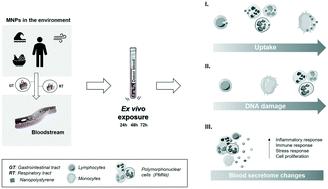当前位置:
X-MOL 学术
›
Environ. Sci.: Nano
›
论文详情
Our official English website, www.x-mol.net, welcomes your feedback! (Note: you will need to create a separate account there.)
Genotoxic and immunomodulatory effects in human white blood cells after ex vivo exposure to polystyrene nanoplastics
Environmental Science: Nano ( IF 7.3 ) Pub Date : 2020-08-27 , DOI: 10.1039/d0en00748j Sandra Ballesteros 1, 2, 3, 4, 5 , Josefa Domenech 1, 2, 3, 4, 5 , Irene Barguilla 1, 2, 3, 4, 5 , Constanza Cortés 1, 2, 3, 4, 5 , Ricard Marcos 1, 2, 3, 4, 5 , Alba Hernández 1, 2, 3, 4, 5
Environmental Science: Nano ( IF 7.3 ) Pub Date : 2020-08-27 , DOI: 10.1039/d0en00748j Sandra Ballesteros 1, 2, 3, 4, 5 , Josefa Domenech 1, 2, 3, 4, 5 , Irene Barguilla 1, 2, 3, 4, 5 , Constanza Cortés 1, 2, 3, 4, 5 , Ricard Marcos 1, 2, 3, 4, 5 , Alba Hernández 1, 2, 3, 4, 5
Affiliation

|
Accumulation of plastic and its derivatives, micro- and nanoplastics (MNPLs), is a substantial environmental and ecological problem that could potentially become a serious health concern to humans. In this study, we propose an attractive approach to obtain new data, using polystyrene nanoparticles (PSNPs) as a model, to understand the risk of human exposure to MNLPs. Whole blood samples from different donors were exposed ex vivo to different concentrations of PSNPs for 24, 48, or 72 h. The effects were analyzed in different subsets of white peripheral blood cells (WBCs), namely lymphocytes, monocytes, and polymorphonuclear (PMN) cells, to assess specific cellular sensitivity. Our results showed no significant toxicity of PSNPs when evaluated in the overall WBC population. Nevertheless, different lineages manifested sharp differences between cell types with very limited uptake in lymphocytes, very high uptake in monocytes, and with intermediate uptake values for PMN cells. Furthermore, a significant increase in the levels of DNA damage was observed in monocytes and PMN cells after PSNP exposure, but not in lymphocytes. Interestingly, our results showed that PSNP exposure induced changes in the whole blood secretome. These findings were further confirmed when the expression of different cytokines was analyzed, revealing a significant increase in the expression of different cytokines related to the inflammatory, immune, and stress response, as well as cell proliferation.
中文翻译:

离体暴露于聚苯乙烯纳米塑料后对人白细胞的遗传毒性和免疫调节作用
塑料及其衍生物,微米和纳米塑料(MNPL)的积累是一个重大的环境和生态问题,可能会成为人类严重关注的健康问题。在这项研究中,我们提出了一种有吸引力的方法,以聚苯乙烯纳米颗粒(PSNP)为模型来获取新数据,以了解人类暴露于MNLP的风险。来自不同供体的全血样本暴露体外在24、48或72小时内,将其分别置于不同浓度的PSNP中。在白色外周血细胞(WBC)的不同子集中,即淋巴细胞,单核细胞和多形核(PMN)细胞中分析了这些作用,以评估特定的细胞敏感性。我们的结果表明,在整个WBC人群中进行评估时,PSNPs没有明显的毒性。然而,不同的谱系表现出细胞类型之间的显着差异,淋巴细胞的摄取非常有限,单核细胞的摄取非常高,PMN细胞的摄取值中等。此外,在暴露于PSNP后,在单核细胞和PMN细胞中观察到DNA损伤水平显着增加,而在淋巴细胞中则没有。有趣的是,我们的结果表明PSNP暴露会引起全血分泌组的变化。
更新日期:2020-11-03
中文翻译:

离体暴露于聚苯乙烯纳米塑料后对人白细胞的遗传毒性和免疫调节作用
塑料及其衍生物,微米和纳米塑料(MNPL)的积累是一个重大的环境和生态问题,可能会成为人类严重关注的健康问题。在这项研究中,我们提出了一种有吸引力的方法,以聚苯乙烯纳米颗粒(PSNP)为模型来获取新数据,以了解人类暴露于MNLP的风险。来自不同供体的全血样本暴露体外在24、48或72小时内,将其分别置于不同浓度的PSNP中。在白色外周血细胞(WBC)的不同子集中,即淋巴细胞,单核细胞和多形核(PMN)细胞中分析了这些作用,以评估特定的细胞敏感性。我们的结果表明,在整个WBC人群中进行评估时,PSNPs没有明显的毒性。然而,不同的谱系表现出细胞类型之间的显着差异,淋巴细胞的摄取非常有限,单核细胞的摄取非常高,PMN细胞的摄取值中等。此外,在暴露于PSNP后,在单核细胞和PMN细胞中观察到DNA损伤水平显着增加,而在淋巴细胞中则没有。有趣的是,我们的结果表明PSNP暴露会引起全血分泌组的变化。



























 京公网安备 11010802027423号
京公网安备 11010802027423号